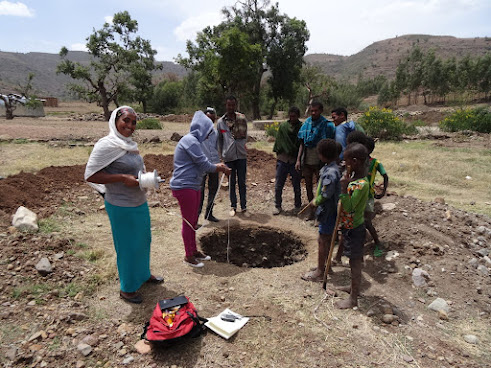Access doesn't mean Empowerment: Small-scale Irrigation in Northern Ghana
Female participation in small-scale irrigation (SSI) has been lauded as an effective development strategy to facilitate female empowerment, as it is associated with a slew of positive outcomes for women. However, NGOs who launch projects aimed at increasing women's access to SSI tend to stop there. While necessary, simply reducing the barrier for women to procure SSI equipment is insufficient to 'empower' them. Today's post explores why SSI development projects directed at women can fail due to a lack of consideration of local sociocultural and household dynamics in Northern Ghana.
Irrigation in Northern Ghana
SSI is practiced on small land areas using a variety of simple technology and structures like buckets, motor pumps and hoses. Ghana's Ministry of Food and Agriculture promotes SSI as a climate change adaptation measure to combat increasingly long dry seasons and food insecurity. Additionally, with greater instances of dry spells occurring during the region's singular rainy season, the rain-fed agriculture production systems are severely hindered. Drained by the Volta River system, approximately 185,000 hectares of land and 500,000 smallholder farmers in Northern Ghana hence turn to shallow groundwater sources such as small reservoirs and wells to irrigate their crops (Figure 1). During dry spells, some crops require continuous watering, and this responsibility typically falls on women, who have to employ labour intensive, manual methods. While the links between women and domestic labour (cooking, caring, cleaning) are well established, their contribution to agricultural production is more 'invisible', despite them making up half the agricultural workforce across Africa.
So, are women really able to reap all the benefits of improved access to SSI?
A study found that for some women, regardless of whether they independently purchased an SSI pump or was given one by an NGO, it still 'belonged' to the men in the household, owing to patriarchal social norms in Ghana that posit men as the agricultural 'supervisors' and women as the 'helpers'. Irrigation technology like motorised pumps are reserved for more lucrative crops that men are responsible for, while women continue to use manual SSI techniques like buckets for subsistence crops. This gendered division of SSI equipment is rationalised by men as motorised pumps being too technologically complicated for women to handle.
Reaping the benefits of access to SSI technology also depends strongly on women's access to other resources, such as water, land and fertiliser. As men often take up the job of digging wells during Ghana's dry season, they control access to the SSI technology withdrawing water from those wells. Further, irrigation requires land closely located to water sources. However, women have less control and access to land, especially highly valued irrigable land. Even if they have irrigable land, it tends to be smaller, of poorer quality and further away from their homes. Especially regarding the latter, this incurs a greater time burden on women, who have competing household responsibilities.
How can we move beyond access?
It is evident that a gendered reading of increasing accessibility to SSI technology must go beyond the 'add women and stir' approach. To facilitate more effective social change, this needs to go hand in hand with wider mindset shifts that consider local gender roles and relations. It is important to include men in such conversations, as projects that focus on women can sometimes be hindered by men that block their participation. By illustrating the benefits of women's involvement in mechanised SSI, men might become more supportive. For instance, some men see the value in SSI on women's plots to increase their income as this reduces the chance of women having to migrate away from the home to find other work.
This is not to say that SSI accessibility projects are always bound to fail. There have been examples of women in Northern Ghana that have benefited greatly from increased access. For women who are able to control and manage the equipment and income from their plots, they are able to increase their decision-making power within the household and channel their independently earned income towards paying for medical bills, school fees, more land and purchasing items for themselves.
I hope this discussion has highlighted the importance of embedding development projects in local contexts, and the broader understanding that 'gender' development projects cannot solely focus on women, but need to acknowledge and include men and the role that they play in perpetuating unequal gender relations that can hinder development.




I really enjoyed your post and think that it is of upmost importance that embedding local contexts into development projects can increase their chances of being successful and meaningfully change lives.
ReplyDelete